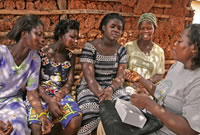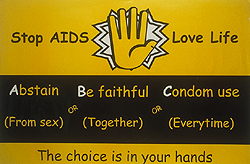

The need for parents to give their children sex education at home cannot be overemphasized, as it is very much needed in this fight against the spread of HIV/AIDS. Research has discovered that what parents tell their children about sex increases the chances by which their children may protect themselves if they ever do engage in sexual intercourse7. However, parents need to be made aware of and act upon this interesting phenomenon because as stated earlier on, if they don’t, they stand the risk of allowing their children to be misled by popular culture as portrayed in the media2. This can be carried out with the help of faith-based organizations such as the church. The church is being proposed here because in a survey of women in Ghana and their knowledge about HIV/AIDS, it was discovered that Christian women knew more about AIDS than any other group, suggesting that the church may be a possible ally in the fight against this disease8. Across the region, that is district by district, seminars for pastors and other religious or community leaders like chiefs can be held by trained personnel to inform these leaders about the need to give children sex education at home. One thing that must be emphasized throughout the duration of these seminars is that they (the leaders) cannot afford to have their congregations and communities keep their children in the dark when it comes to sex and HIV/AIDS because if they don’t tell them early enough, they stand the risk of allowing their children to be influenced, perhaps negatively, by someone else2. The curriculum for these seminars will be as follows:
1. In light of the fact that about 80% of all HIV patients in Ghana contracted the disease through heterosexual contact, participants will be encouraged to counsel their children, families, congregations or communities about the benefits of abstinence, since abstinence is the surest way to avoid contracting the disease sexually.
2. Participants will be informed about the benefits of using a condom during sexual intercourse especially with an unknown partner or with a partner whose HIV serostatus is unknown to them as well as taught how to use condoms. They will also be informed that though condoms do not eliminate the risk of contracting any STD, they reduce this risk considerably, especially with HIV9.
3. They will be shown statistics which indicate that children are having sex as early as age 111. They will also be shown slides of real Ghanaians who have contracted the disease and the devastation the opportunistic infections have caused to their bodies. This, is intended to convey the message that, “You, your son or daughter could be next if you decide to keep silent.”
4. They will also be encouraged to advise their children to desist from sharing needles, blades and various sharp objects with others as it could put them at risk of contracting the disease.

Personnel for this program must hail from the Eastern Region of Ghana and must be able to speak the local dialect as well as educate the people using the local dialect. This is intended to help foster a sense of unity and trust among the people and the personnel. Even though these seminars are primarily geared towards sensitizing parents on the need to give their children sex education, some parents may opt out of informing their children about the possibility of using condoms because that may indirectly connote that they sanction sex outside marriage. Nevertheless, their effort will still go a long way in helping increase HIV/AIDS awareness in the region.